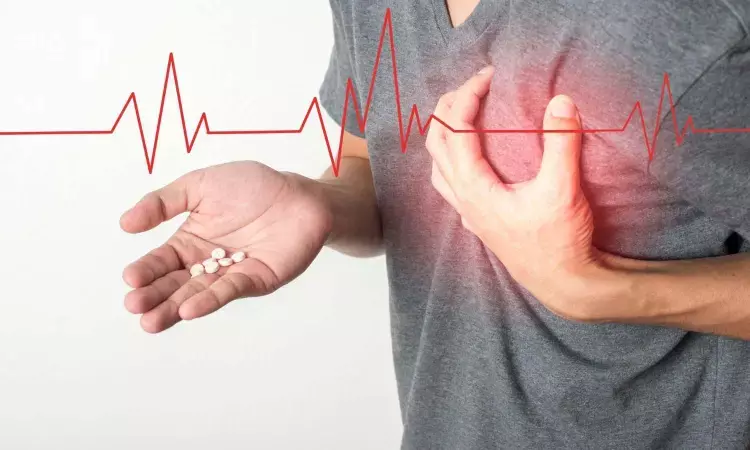- Home
- Medical news & Guidelines
- Anesthesiology
- Cardiology and CTVS
- Critical Care
- Dentistry
- Dermatology
- Diabetes and Endocrinology
- ENT
- Gastroenterology
- Medicine
- Nephrology
- Neurology
- Obstretics-Gynaecology
- Oncology
- Ophthalmology
- Orthopaedics
- Pediatrics-Neonatology
- Psychiatry
- Pulmonology
- Radiology
- Surgery
- Urology
- Laboratory Medicine
- Diet
- Nursing
- Paramedical
- Physiotherapy
- Health news
- Fact Check
- Bone Health Fact Check
- Brain Health Fact Check
- Cancer Related Fact Check
- Child Care Fact Check
- Dental and oral health fact check
- Diabetes and metabolic health fact check
- Diet and Nutrition Fact Check
- Eye and ENT Care Fact Check
- Fitness fact check
- Gut health fact check
- Heart health fact check
- Kidney health fact check
- Medical education fact check
- Men's health fact check
- Respiratory fact check
- Skin and hair care fact check
- Vaccine and Immunization fact check
- Women's health fact check
- AYUSH
- State News
- Andaman and Nicobar Islands
- Andhra Pradesh
- Arunachal Pradesh
- Assam
- Bihar
- Chandigarh
- Chattisgarh
- Dadra and Nagar Haveli
- Daman and Diu
- Delhi
- Goa
- Gujarat
- Haryana
- Himachal Pradesh
- Jammu & Kashmir
- Jharkhand
- Karnataka
- Kerala
- Ladakh
- Lakshadweep
- Madhya Pradesh
- Maharashtra
- Manipur
- Meghalaya
- Mizoram
- Nagaland
- Odisha
- Puducherry
- Punjab
- Rajasthan
- Sikkim
- Tamil Nadu
- Telangana
- Tripura
- Uttar Pradesh
- Uttrakhand
- West Bengal
- Medical Education
- Industry
Iron induces chronic heart failure in half of heart attack survivors, finds landmark study

According to landmark study led by IU researchers Iron induces chronic heart failure in half of heart attack survivors. According to researchers, iron drives the formation of fatty tissue in the heart and leads to chronic heart failure in about fifty percent of heart attack survivors.
The discovery paves the way for treatments that have the potential to prevent heart failure in nearly half a million people a year in the United States, and many millions more worldwide.
The study has been published in Nature Communications.
"For the first time, we have identified a root cause of chronic heart failure following a heart attack," Dharmakumar said. Dharmakumar is executive director of IU's Krannert Cardiovascular Research Center and associate director for research at the Cardiovascular Institute, a joint enterprise between IU School of Medicine and IU Health.
"While advances across populations have made survival after a heart attack possible for most, too many survivors suffer long-term complications like heart failure," said Subha Raman, MD, who is physician director of the Cardiovascular Institute. "Dr. Dharmakumar's breakthrough science illuminates who is at risk and why and points to an effective way to prevent these complications."
The multi-million-dollar study, which involved collaborators from institutions in the United States and Canada, followed large animal models over six months. It found that in heart attacks that result in bleeding within the heart muscle-which is about half of them-scar tissue is slowly replaced by fat. Fatty tissue can't push blood from the heart effectively, and this is what leads to heart failure and eventually to death in many survivors of hemorrhagic heart attacks, Dharmakumar said.
"Using noninvasive imaging, histology and molecular biology techniques, and various other technologies, we have shown that iron from red blood cells is what drives this process," he explained. "When we removed the iron, we reduced the amount of fat in the heart muscle. This finding establishes a pathway for clinical investigations to remedy or mitigate the effects associated with iron in hemorrhagic myocardial infarction patients."
Reference:
Cokic, I., Chan, S.F., Guan, X. et al. Intramyocardial hemorrhage drives fatty degeneration of infarcted myocardium. Nat Commun 13, 6394 (2022). https://doi.org/10.1038/s41467-022-33776-x
Dr Kamal Kant Kohli-MBBS, DTCD- a chest specialist with more than 30 years of practice and a flair for writing clinical articles, Dr Kamal Kant Kohli joined Medical Dialogues as a Chief Editor of Medical News. Besides writing articles, as an editor, he proofreads and verifies all the medical content published on Medical Dialogues including those coming from journals, studies,medical conferences,guidelines etc. Email: drkohli@medicaldialogues.in. Contact no. 011-43720751


